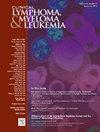Advancing the Management of CH, MDS, and AML From the First Bridging the Gaps in Leukemia, Lymphoma, and Multiple Myeloma Conference
IF 2.7
4区 医学
Q2 HEMATOLOGY
引用次数: 0
Abstract
Purpose
The management of myelodysplastic syndromes (MDS) and acute myeloid leukemia (AML) have evolved substantially in recent years with the development of targeted therapies and novel nontargeted approaches. However, many questions remain about how to best use current therapies, and there is a large unmet need for effective therapies, particularly for patients with higher-risk MDS, AML, and those with MDS/AML relapsed/refractory (R/R) to prior therapy.
Methods and results
A panel of experts was assembled to discuss current controversies and unanswered questions in the care of patients with MDS and AML. Workshop topics included: molecular testing and new classification systems, clonal hematopoiesis, treatment of MDS (lower-risk and higher-risk), frontline treatment of AML, treatment of special populations, treatment of R/R AML, and novel approaches.
Conclusions
We identified many areas of ongoing controversy in the diagnosis and management of MDS and AML related to classification and risk assessment, treatment selection, sequencing of therapies, and monitoring of responses. Many clinical trials are ongoing to further improve outcomes for patients with MDS and AML, and we noted potential areas of debate related to study design, selection of endpoints, and assessment of responses. The controversies and gaps in knowledge identified by this panel will inform a follow-up conference in 2025 that will employ a modified Delphi method with a goal of developing and publishing formal consensus recommendations that can provide actionable guidance to clinicians in practice.
从第一届缩小白血病、淋巴瘤和多发性骨髓瘤的差距会议开始,推进对 CH、MDS 和 AML 的管理。
目的:近年来,随着靶向治疗和新的非靶向治疗方法的发展,骨髓增生异常综合征(MDS)和急性髓系白血病(AML)的治疗发生了实质性的变化。然而,关于如何最好地利用现有疗法仍存在许多问题,并且对有效疗法的需求仍未得到满足,特别是对于高风险MDS、AML患者,以及MDS/AML复发/难治性(R/R)患者。方法和结果:召集了一个专家小组,讨论当前MDS和AML患者护理中的争议和未解决的问题。研讨会主题包括:分子检测和新的分类系统,克隆造血,MDS(低风险和高风险)的治疗,AML的一线治疗,特殊人群的治疗,R/R AML的治疗以及新方法。结论:我们确定了MDS和AML的诊断和管理中许多持续存在争议的领域,包括分类和风险评估、治疗选择、治疗排序和反应监测。许多临床试验正在进行中,以进一步改善MDS和AML患者的预后,我们注意到与研究设计、终点选择和反应评估相关的潜在争议领域。该小组确定的争议和知识差距将为2025年的后续会议提供信息,该会议将采用改进的德尔菲法,目标是制定和发布正式的共识建议,为临床医生在实践中提供可操作的指导。
本文章由计算机程序翻译,如有差异,请以英文原文为准。
求助全文
约1分钟内获得全文
求助全文
来源期刊

Clinical Lymphoma, Myeloma & Leukemia
ONCOLOGY-HEMATOLOGY
CiteScore
2.70
自引率
3.70%
发文量
1606
审稿时长
26 days
期刊介绍:
Clinical Lymphoma, Myeloma & Leukemia is a peer-reviewed monthly journal that publishes original articles describing various aspects of clinical and translational research of lymphoma, myeloma and leukemia. Clinical Lymphoma, Myeloma & Leukemia is devoted to articles on detection, diagnosis, prevention, and treatment of lymphoma, myeloma, leukemia and related disorders including macroglobulinemia, amyloidosis, and plasma-cell dyscrasias. The main emphasis is on recent scientific developments in all areas related to lymphoma, myeloma and leukemia. Specific areas of interest include clinical research and mechanistic approaches; drug sensitivity and resistance; gene and antisense therapy; pathology, markers, and prognostic indicators; chemoprevention strategies; multimodality therapy; and integration of various approaches.
 求助内容:
求助内容: 应助结果提醒方式:
应助结果提醒方式:


